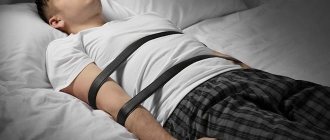The word "hospital" directly speaks of pain. He who is not afraid of pain can be considered a happy person! Most people tend to put off visiting a doctor, but only those who are gripped by fear of doctors will do so as long as they have the strength to endure their suffering. Some people shudder at the thought of having their blood drawn in a laboratory or having to get vaccinated. Unlike a child who dodges, runs away, and screams obscenities, an adult, as a rule, knows how to muster all his will - and, if absolutely necessary, courageously go through all the necessary procedures. As a rule, these actions are accompanied by increased blood pressure, rapid heartbeat and shortness of breath, nausea, and spasms in the gastrointestinal system. Is this normal?
In countries with high quality standards of medical care, it has long become the norm to adapt the environment in which a person is forced to be helpless into one that is as comfortable and calm as possible. The generally accepted ethics is the doctor’s attitude towards the patient not as an object or object of healing manipulation, but as a living person. Since our medicine still operates according to the standards of a field hospital (post-war legacy), the psychological comfort of the patient who sees the doctor is the last thing that is taken care of. This is one of the most important factors that aggravate such a common phenomenon as the fear of doctors - iatrophobia .
In general, the figure of the doctor in Russian culture is still sacralized. The doctor’s word is law; it is addressed from the bottom up, without analyzing the prescribed treatment regimen or therapy. At the same time, each of us has experience of unsuccessful treatment and incorrect selection of medications (which, unfortunately, can lead to tragic consequences) and interaction with “bad” doctors. A psychologist, as a rule, not dressed in a white coat, is perceived in two ways: on the one hand, the attitude is not always serious (“You are not a doctor!” - this phrase sounds like a statement of incompetence, inability to provide full assistance), on the other hand, only the absence of white a robe often saves the client from developing fear and mistrust. This is why I, as a clinical psychologist, believe it is important to talk about issues of proper interaction with doctors.
Causes of phobia: fear of doctors
Fears do not appear just like that, without a reason; any fear arises from some factor, a situation that is negatively deposited in a person’s memory. This can be any medical procedure, each of which is associated with pain and discomfort. Many patients, at the mere word of surgery or the need for surgical intervention, begin to panic and find excuses to go to the hospital. They develop fear for their own lives and mistrust of the attending physician.
According to sociological surveys, 60% of the population of our country do not trust people who took the Hippocratic oath, and 15% go to private clinics, where the quality of service is slightly better than in ordinary public clinics. And the state of hospitals, clinics and other medical institutions leaves much to be desired. And if you add the boorish attitude, incorrect diagnoses, unqualified assistance, and sometimes complete indifference of the staff, it becomes clear that even a person with a healthy psyche will not have the desire to seek any help.
Suspiciousness and self-doubt, an inferiority complex plays an important role in the fact that some adults do not go to the dentist for years. As a result of this, they end up with a sad state of their oral cavity.
Women, and especially young girls, due to their inexperience and lack of knowledge, do not undergo an ordinary routine medical examination by a gynecologist. They are sure that if nothing bothers you, then visiting a female doctor is not advisable. This is a huge stupidity, since many dangerous diseases are asymptomatic and you will still need to go to the hospital later. It’s just that the disease will no longer be in its initial stages.
Interesting facts about people's attitudes towards dentists
Effective painkillers appeared in medicine relatively recently, and in dentistry for a long time anesthesia was used only for the most painful operations. Almost always, dental treatment was carried out “live”, and the patient was forced to endure all the dentist’s manipulations in the oral cavity. After this, powerful impressions remained, which only intensified with each memory and could even develop into a real phobia. By the way, fear of dentists has three scientific names: dentophobia, stomatophobia or odontophobia (all three words are synonyms, but the most established form is dentophobia). Some statistics:
- ;
- approximately 10% of patients experience panic fear before dental treatment;
- in 90% of cases, successful dental treatment in childhood saves a person from dental phobia for life;
- approximately 2% of Russians have never been examined by a dentist in their lives.
;
;
As a rule, fear of dentists develops after severe stress associated with dental treatment. Pain is not necessarily the cause, since a person may experience panic simply from the sensation of strong mechanical effects on the dental tissue or jawbone. In addition, the effectiveness of anesthetic drugs can be significantly reduced due to the patient’s excessive concentration on his sensations or due to drinking alcohol “for courage.”
What happens to a person with iatrophobia?
A process starts in the body when the brain gives a signal for the release of adrenaline. The body cannot cope with its amount. This causes a sharp deterioration in health (tachycardia, high blood pressure, diarrhea and trembling of the limbs, dry mouth, shortness of breath, complete lack of understanding of the current situation, inappropriate behavior).
Phobia of fear of doctors requires treatment, but the patient needs to go directly to the person he is already afraid of! It turns out to be a complete vicious circle! But this is not a hopeless situation.
What to do with health
Sometimes feeling unwell gives certain bonuses. Firstly, the patient is given more attention and freed from everyday problems, and secondly, anxiety about health fills the inner emptiness. It is beneficial for a person to be sick, since it gives indulgence to do nothing (I feel so bad), to be irresponsible (you have no right to demand when I am in this state), to be unsuccessful (if I were healthy, then, of course, I would and so...).
To get out of this situation, first think about what your illness gives you. Then ask yourself the question: “What will I do when I stop getting sick and worrying? What will I do when I feel good?” The question “Why be healthy?” It sounds almost absurd (obviously), but this is a really serious question that requires the most honest answer possible. Lying to yourself is an expensive pleasure. Maybe you could finally tidy up your summer cottage or take care of your grandchildren? Or maybe you have long been dreaming of a vacation in warmer climes? If the motivation is strong enough, the fear of going to the doctor will disappear by itself.
Article on the topic
How to prevent diseases? 10 tests everyone needs to take
How to overcome this phobia
Any case of fear of doctors is individual and requires specific treatment. It is possible to get rid of jatrophobia only by finding the cause. If you analyze your inner sensations, thoughts, feelings, then this can be done by the person himself. But if, when remembering the doctor, panic and hysteria begin, it is very difficult to calm down, then the help of a psychologist is needed. To avoid visiting the hospital, it is better to go to a private clinic or call a doctor at home.
If you decide to seek help from any medical institution, then take with you a person with whom you will feel at ease and calm. He will support and understand in difficult times for you.
How not to confuse the phobia of fear of doctors with ordinary fear
A striking example and portrait of a jatrophobe - he is very actively interested in treatment with folk remedies and methods of alternative medicine. All this is explained by the fact that he believes more in some grandmother’s healer, who can cure him using a photograph or simply by preparing some special decoction. This is simple self-deception.
There are cases in the practice of doctors when jatrophobia was passed on from generation to generation.
The reason why children are afraid of doctors
Or as it is also called by professionals, iatrophobia lies largely in the behavior of the parents, since the child copies this fear from adults.
He remembers their every word and expression. When they talk about how they hurt in the hospital, how dangerous and scary it is.
It is also worth taking into account the individual characteristics of the baby; some children do not like tactile communication; any touch from strangers is at least unpleasant for them. Perhaps the child has a low pain threshold and no matter what is done in any medical institution during various procedures, it causes pain for him. With such children, even after one unsuccessful visit to the clinic, it is difficult to persuade them to just go there.
In most cases, the adults with whom the child lives are to blame for jatrophobia in children. If a mother and her child behave insecurely and too emotionally when visiting the hospital, then the child feels the same way. This is where his panic and hysteria arise.
Manifestations
Fear of medical personnel is expressed in a certain way. It is difficult not to notice these manifestations and remain indifferent to them. As a rule, this is how a person discovers an existing problem.
Symptoms in the body
When different people need to visit a doctor, they experience a lump in their throat, sweaty palms, nausea, and dizziness. Some people are literally haunted by the feeling of lack of air. This is how strong fear manifests itself, which a person cannot cope with using ordinary methods. In some cases, it becomes difficult to even leave the confines of your own apartment.
Trembling in the body
A panic attack is characterized by the appearance of certain symptoms in the body. In most cases, there is tremors that become difficult to control. The person begins to feel chills. This happens as if out of the blue. The mere thought of having to visit a doctor causes serious anxiety. A strong feeling of anxiety, apathy, and a feeling of fatigue, despair and hopelessness appears.
Avoiding medical offices
The need to conduct an examination becomes real torture for a person. Some people immediately, at the very thought, begin to have panic attacks. The individual really withdraws into himself and is afraid to think about future prospects. Whenever possible, he tries to minimize visits to doctors. Even if something really worries you about your health, most likely the individual will prefer to remain silent or try not to pay attention at all. At a clinic appointment, such people behave extremely constrained. They look taciturn, are constantly nervous and glance at their watches, as if they are in a hurry.
Causes of phobia: fear of doctors
- In adults, the reasons for this fear arise from the fact that they have encountered a medical error in the past. The situation gets worse when a relative or friend died because of it.
- Particularly suspicious and impressionable people, having watched enough films about hospital workers who are not entirely competent in their work, read terrible cases on the Internet about incorrect diagnoses, involuntarily become jatrophobes.
- When visiting a doctor, the patient is forced to entrust his health, and sometimes even his life, to some stranger. It turns out that the patient directly depends on the mood and knowledge of this stranger in a white coat! It happens that a doctor is an expert in his field, and he has been working for a long time, but there is no line outside his office. It’s just that some specialists can be professionals, but at the same time be callous, ill-mannered people.
- An insecure person is embarrassed about his body. Therefore, it is difficult for him to go to the doctor and show his body, which he himself does not like, he is ashamed of it.
- Fear of pain during treatment. Many procedures are naturally unpleasant, but the development of medicine has stepped forward significantly. To avoid pain, there are modern drugs that successfully combat this.
- People with various addictions, be it alcohol, food, tobacco, drugs, are all ardent opponents of visiting hospitals. They often avoid doctors, assuming that they will tell them about their unhealthy lifestyle and force them to undergo treatment.
- Some people are simply afraid that the doctor will find some kind of disease and this is what prevents them from going to the hospital.
- Difficult financial situation of a person. In such cases, this is a good reason for refusing to go to the hospital.
SYMPTOMS of jatrophobia
- Nervous tremors, muscle tension; - Nausea, cramps in the stomach or intestines; — Increased pressure in the walls of the doctor’s office, with a normal level of pressure in a familiar environment; - Fear of the slightest ailment such as a cold or a minor wound on the body due to the fact that you will need to see a doctor. The condition may be similar to hypochondria; — Long-term postponement of a visit to the doctor or a trip to the laboratory for testing, even in the presence of pain and disturbing physical manifestations; — In a child’s case: screaming, trying to escape, hysterical crying.
A common sign of a jatrophobe is an active passion for methods and means of alternative medicine, the search for “proven” and tested drugs through asking friends.
Symptoms of phobia: fear of doctors
The manifestation of such fear in children consists of hysteria and panic. In adults, symptoms are much more severe and severe. These are headache, nausea and vomiting, diarrhea, shortness of breath, a sharp increase in blood pressure, trembling limbs, rapid heartbeat, inadequate perception of what is happening, sleep disturbance, dry mouth, excessive sweating, blurred vision (darkening in the eyes).
People suffering from this fear postpone visiting the hospital until a critical moment. Therefore, this can end sadly, even fatally.
What should true dentophobes do?
An ordinary person, experiencing fear of the dentist, understands the need for dental treatment, overcomes anxiety and successfully completes all procedures. With dental phobes, everything is much more complicated; these are the most difficult patients for dentists. Psychologists divide dentophobia into three types:
- congenital – unfounded; patients have been afraid of various medical procedures since childhood;
- acquired – appears on the basis of one’s own negative experience;
- fictional - develops under the influence of scary stories about dentists heard from friends or seen in movies.
People suffering from dental phobia put off visiting a doctor until the last minute. They take pills, use dubious traditional methods, suffer from pain, but still do not go to the hospital. In extreme cases, when the condition of the tooth is deplorable, dentophobes agree to have it removed.
Before visiting the dental office, such patients experience the following symptoms:
- increased blood pressure;
- pain in the heart area;
- noise in ears;
- increased breathing and heart rate;
- dizziness, up to loss of consciousness;
- feeling of a lump in the throat;
- sticky sweat appears;
- abdominal pain, diarrhea, vomiting;
- trembling of the limbs and head;
- tears;
- hysterical fits.
Patients may be excessively talkative; some grab the doctor’s hands when they see a syringe or instrument.
Such patients need the help of a psychotherapist before visiting the dentist. The specialist will find out the cause of panic fear and, if necessary, prescribe medication, hypnotherapy or acupuncture.
Dental treatment for patients suffering from dental phobia must be carried out using sedation. Additionally, some clinics use calming methods such as relaxation music and video glasses.
How to deal with phobia of fear of doctors
There are several options.
Sometimes a psychologist uses a method such as hypnosis treatment, group therapy, or psychoanalysis sessions.
If a person’s psyche is upset to a critical state, then drug treatment is carried out. The treating specialist prescribes sedatives (motherwort, valerian, phytosed, glycesed, sedistress, glycine).
In the complex, you can add treatment with folk remedies (decoction of mint, lemon balm, linden inflorescence, lavender, hops, chamomile).
Here are some recipes for soothing decoctions and tinctures:
- The tincture consists of equal parts of valerian root, fennel fruit, mint, lemon balm and caraway. Brew one tablespoon of the prepared raw material per glass of boiling water.
- This tea has a very fast effect: one part St. John's wort, horsetail, two parts black and green tea. Brew two tablespoons of this mixture in half a liter of water and leave. Add honey to taste.
- This tincture is also very calming: Two bay leaves, two cloves, a small piece of ginger and one teaspoon of cumin. Pour boiling water over and boil for ten minutes, and then infuse. All these soothing tinctures must be taken morning and evening, half a glass*
- Valerian roots, oats and lemon balm, peony rhizomes, motherwort, common hop cones - all this is mixed in equal parts and poured with vodka or alcohol. Infuse for half a month and then filter. Take one teaspoon before bedtime.
Important: never self-medicate. Consult your doctor even if you decide to drink soothing teas and tinctures, as they may have an adverse effect if taken uncontrolled. All of them have contraindications.
My knees are shaking!
It happens that panic seizes the patient before leaving home or on the way to the clinic. In this case, relaxation exercises will help.
If your health allows, do exercises or cleaning - any physical activity reduces stress levels and gives an outlet for accumulated adrenaline. If there is no way to relieve tension in this way, then at least go to the doctor on foot, and not by bus.
Breathing with a long exhalation. This is a yoga exercise. Breathe so that the exhalation is 1.5 times longer than the inhalation. In just 2-3 minutes you will feel the tension go away and your heart rate normalize. When the heartbeat is disrupted, the body perceives this as a threat - and panic intensifies.
Smile or bare your teeth. You can take a pencil in your teeth so that it is parallel to your shoulders and stretch your lips. If the muscles that are involved in smiling are engaged, the muscles of the collar zone automatically relax. And when the neck and shoulders are not constrained, the person calms down.
Article on the topic
Overcome anxiety. When can you handle it yourself, and when is it time to see a doctor?
Advice for parents with a phobia of fear of doctors
Tell and explain to your child the significance and importance of visiting the hospital.
Talk to your child before visiting a pediatrician or other doctor; the dialogue should be open in order to clarify all the children's fears and anxieties. The child will tell the honest truth if he sees openness, love, respect and care on your part.
In many cases, parents themselves create comfort and tranquility in the hospital. For example, take your baby's favorite toy with you. Buy juice or candy, lollipops, vitamins, whatever your baby loves to eat. Let this be a little incentive for the child.
How to stop being afraid of injections? It is strictly forbidden for parents to scare their child with injections or a scary doctor who hurts. In no case should you threaten your child with phrases that they will leave him to live in the hospital if he does not obey. Maybe these methods will work, but only the first time. And as time passes, you may find out that such phrases remain in your memory for a long time. They can repeatedly affect the child’s behavior. After all, the child’s psyche is completely different from the adult psyche. Be careful with such expressions!
Psychological assistance for dental phobia
We bring to your attention some professional advice on how to overcome fear of dentists, from psychotherapists who regularly help patients solve this problem:
- ;
- You need to understand for yourself that dental health is the basis for the health of the whole body, so it is imperative to treat them. And the sooner help is provided, the faster and simpler the procedure will be.
- If the patient cannot overcome fear on his own, then you can always use the help of a psychotherapist or psychoanalyst.
- Confidence in the competence of doctors helps to significantly reduce fear. Therefore, you need to immediately choose a good clinic that uses modern equipment and anesthesia methods.
- It is advisable to create a trusting atmosphere, so you will know that the dentist is striving to make the treatment process as comfortable as possible for you. It’s good if this is a friend or family doctor whom you always visit.
- To understand how to overcome fear of the dentist, you need to find out what causes this fear. Most often this is a misconception about the treatment process. Just talk to your doctor and ask what technologies he will use to reduce pain.
- It is advisable that the clinic be free of odors of bleach, formaldehyde, other chemicals and medications. Often these odors become the cause of psychological discomfort.
;
;
;
;
;
What is the reason?
There is no single reason for the development of nosophobia, however, experts identify a number of factors that can become the fertile soil on which a person’s panicky fear of disease grows. As often happens, the phobia may be caused by the patient’s negative life experiences. In the case of nosophobia, this may be a serious illness that the nosophobe himself or someone close to him suffered in the past.
The personality traits of the patient also play an important role - how suspicious, impressionable he is, whether he is prone to pessimism, whether he easily tolerates negative events or, on the contrary, gets fixated on them. Sometimes having a “disease” is a desperate attempt to attract the attention of others. This is especially true for people with low self-esteem.
The accessibility of the Internet also contributed to the spread of this phobia. Today, when the World Wide Web is replete with all kinds of medical resources, we can easily find out everything about any disease. It’s good if this information is used simply to broaden your horizons. But what if a person prone to nosophobia ends up on such a site? He will definitely find a couple of symptoms that he just read about.











